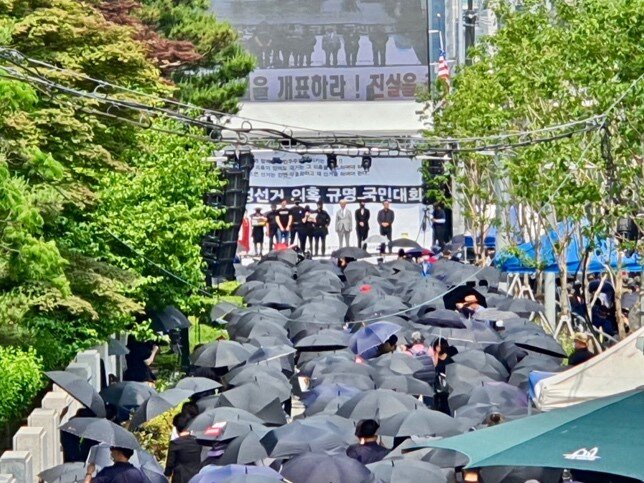The train glided along across the Han river, Line 4 (the light blue line), headed for Sadang. I am on my way to the weekly 4.15 (April 15) Election Black Protests in Seocho, Seoul. By the time I transfer at Sadang Station and arrive at Seocho Station the train car is packed with protestors: dressed from head to toe in black – some even wearing black sunglasses. The high-tech modern Seoul subway car comes to a smooth halt, the doors open and the black mass pours onto the platform and towards the exits. Two young people dressed in all black, with black masks and black umbrellas, stand next to a placard reading, (4.15 National Assembly Election Fraud Condemnation), guiding the protestors to the destination.

The cracked red design on the placard represents the belief by a growing, not so silent majority in South Korea that the recent National Assembly elections were fraudulent. The Epoch Times reports, “The April parliamentary elections in South Korea were a resounding triumph for the ruling Democratic Party, or DPK, of President Moon Jae-in. However, accusations and suspicions have since emerged that the victory may have been tainted by fraud and vote-rigging.”Mr. Tae-jun Kang of The Diplomat reported on May 22, 2020, “growing suspicions among South Korean online users over China’s interference operations in the country.” South Korean politician, Kyung-wook Min, from the United Future Party, “claims Chinese interference and influence” in the recent 21st South Korean National Assembly Election. USA Today reported, “the controversy gained serious momentum when University of Michigan professor Walter R. Mebane, Jr. concluded election fraud was suspected in 43.1% of the Pre-Election Day voting and 3.14% of Election Day voting.” Dr. Tara O writes, “East Asia Research reported that the wrongdoing in the election likely involved digital fraud – i.e., the manipulation of vote-counting machines, computer hardware and software, and information network telecom equipment apparently manufactured by controversial Chinese tech giant Huawei.”
Separate from the serious possibility of electronic election fraud perpetrated by hackers working for the Chinese Communist Party (CCP), other experts have brought to the fore obvious physical evidence pointing towards election fraud.Author John Cha reported, “blank ballots were counted for the ruling party, NEC workers were caught on CCTV, the existence of unauthorized ballot material and blatant ballot stuffing.”
I emerged from the subway into the blazing hot mid-afternoon to see the weekly “Black Protests” in front of the iron gates of South Korea’s National Supreme Court. I expected a few protestors lining the sidewalks, shouting through bull horns. Instead, a massive stage played host to tens of thousands of protestors dressed in black from head to toe. On cue they pulled black umbrellas out and opened them in solidarity with the Hong Kong protests.
Why Hong Kong? Well, here in South Korea, as well as across the world, there is a disturbing trend of CCP efforts to influence, manipulate, and coerce democratic institutions. The CCP mobilized tens of thousands of Chinese tourists and exchange students to inflate the size of the Candlelight Demonstrations of 2016. With South Korea’s installation of THAAD (Terminal High Altitude Area Defense), in 2016, theCCP hammered the South Korean economy with unofficial economic sanctions, also known as “Korean Wave Sanctions” in South Korea, for the ban on all Korean cultural products (K-Movies, K-Pop, K-Drama). The South Korean economy is struggling to recover from the heavy-handed throttling by the authoritarians in Beijing, seeking to force South Korea to its knees. The 2019 Hong Kong pro-democracy protestors, inspired by the South Korea’s history of democratization, sing Gwangju Uprising songs from the 1980s.South Korean students are bullied on South Korean campuses by Chinese exchanges students for their support of the Hong Kong protestors. Their voices are heard by South Korean citizens, who support them, but not by the Moon administration in Seoul. Out of fear of increased economic sanctions from Beijing, the Moon administration sees the Hong Kong democracy movement, as nothing more than an “internal issue” for the CCP. The former Human Rights Lawyer, President Moon, has yet to comment on human rights abuses in Xinjiang and Hong Kong.
More recently in the US Presidential Election theAssociated Press reports on Chinese influence operations, “Did TikTok teens, K-Pop fans punk Trump’s comeback rally?” The CCP owned TikTok social media platform worked in concert with “K-Pop” leaders to mobilize activists around the world to “troll” President Donald Trump’s first rally in Tulsa, Oklahoma. The activists purchased thousands of tickets to the rally and did not attend. The result was a half empty auditorium, although the venue was sold out weeks in advance.
Democratic institutions around the world are now under direct, open assault from authoritarian regimes led by the Chinese Communist Party. The time has come to protect and stand tall with our fellow democratic nations against the bullying of the CCP. The time has come for the U.S. to stand tall with South Korea and support it as the light of democracy and liberty in East Asia. The time has come to stand together.






